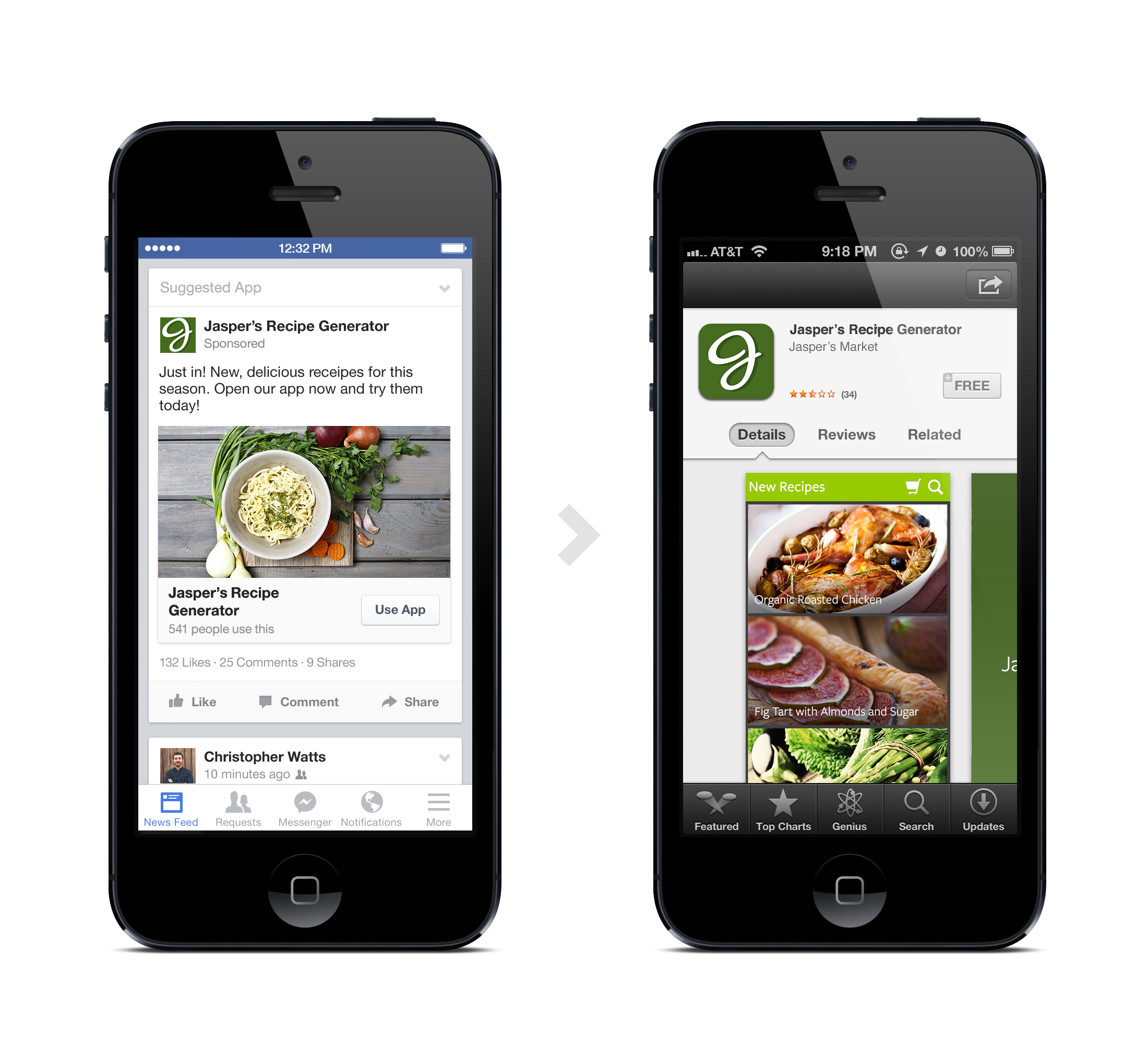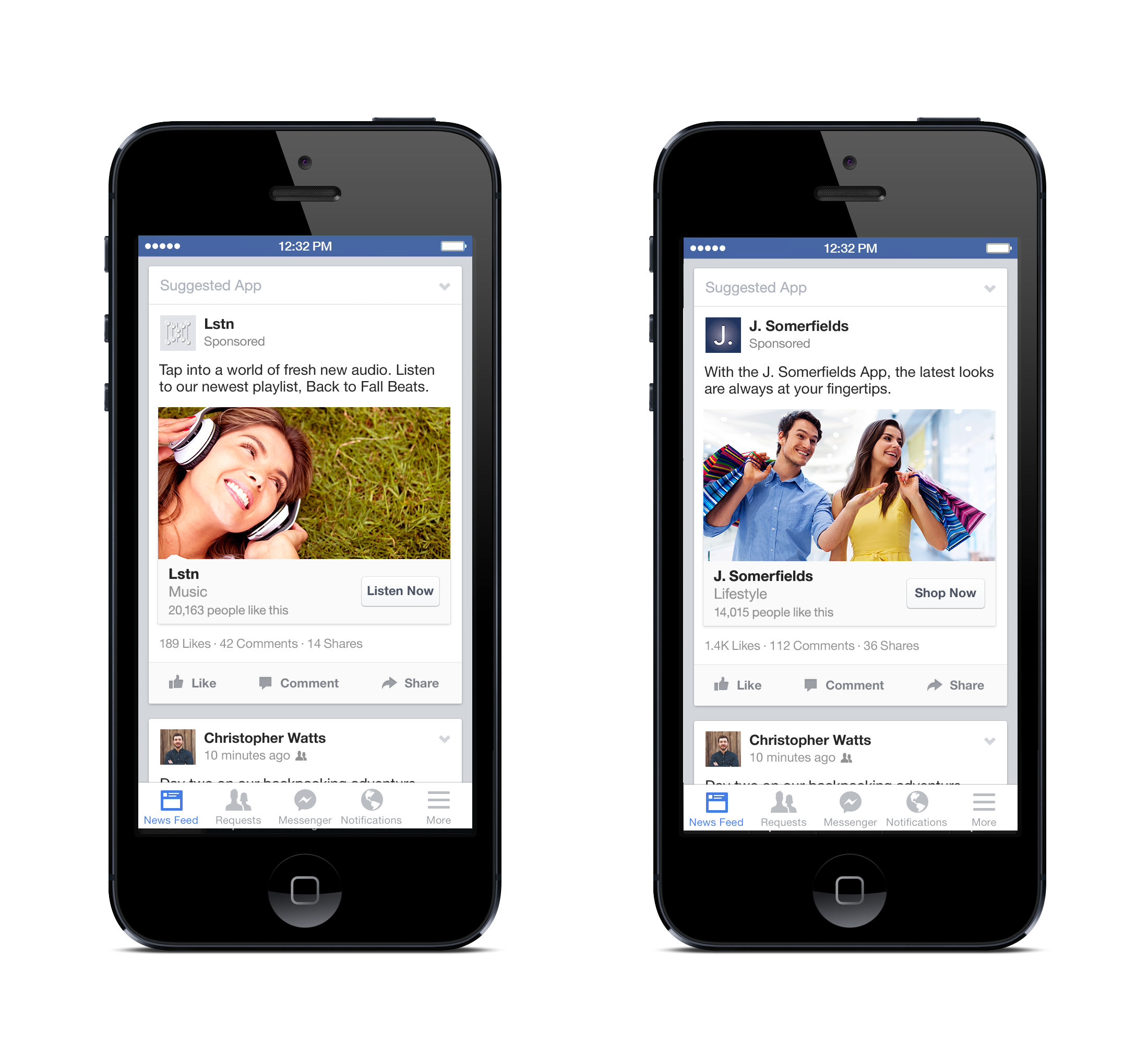
Get your FREE 30-day trial.
Please complete all fields.
Facebook introduced Mobile App Install and Engagement Ads last year (see video below). Many marketers, though, are still struggling with what exactly mobile app install and mobile app engagement ads really are and how they can provide value to their business.
What are Facebook Mobile App Ads?
To start, it would be best to define and show what exactly I mean when I talk about Facebook Mobile App Ads. Facebook currently offers two major ad units in the mobile app category: Install Ads and Mobile App Ads for Engagement and Conversion.
Install Ads
According to Facebook, mobile app install ads-like the one in the image below-are designed to "drive installs to your mobile app with just a click to the App Store and Google Play."

They are extremely easy to set up by following Facebook's guidelines below:
You can now get your mobile app ad for installs up and running very easily by copying and pasting your app's Google Play or Apple App Store URL into the Ads Create Tool, and by linking your ad to a Facebook Page. If you're new to developing on Facebook, this is a quick and easy way to get started. Read our simple steps under Get Started Running Mobile App Ads for Installs, and then go to our Ads Create Tool to get started.
Install ads have become extremely popular for mobile app companies and businesses with mobile apps. Our research showed that the average cost per install worldwide through our Social.com platform is $4.29.
Mobile App Ads for Engagement and Conversion
Facebook also helps businesses garner further engagement within their app using Facebook ads. Facebook defines it below:
Mobile app ads help drive engagement and conversion for your app with ads that take users to a customized location within your app.
For example, a travel app can target its existing users with relevant flight deals in an ad with a call to action to "Book Now" for a flight. When the person clicks the ad, they will be sent straight into the app to the flight deal advertised. Another example is a game can run an ad to its existing players to try a new level or start a match, with a "Play Game" call to action.

These ads drive your users back into your mobile app and allow you to direct them (using deep-linking) to specific content within your app, driving deeper engagement with your app and higher conversions in your mobile app. Both these ad types help marketers drive awareness, acquisition, and engagement with their mobile apps and their brand.
The powerful part of these ads, though, is the targeting abilities you have with Social.com and Facebook.
The Benefits of Facebook Mobile App Ads
According to Flurry, 86% of time on mobile is spent in apps. I don't have to tell you how important mobile is to the future of your marketing and your business. The issue, though, arises when you start to look at the mobile ecosystem and the key challenges marketers see-discovery and acquisition in a crowded mobile app ecosystem (>2M apps on iOS and Android), engagement with your audience when 66% of app users only open an app between 1-10 times, and measurement in a complex ecosystem with no mobile tracking cookies.
Facebook mobile app ads, though, can make these much easier for marketers. Using data, Facebook gives you the ability to target precise audiences and move toward a 1:1 personalized approach. With over 1.3B monthly active users and 654M mobile daily active users, Facebook has incredible reach and scale.
You also have the ability to use your own first-party data using ExactTarget Marketing Cloud's Active Audiences and Facebook's Custom Audiences. This gives you the ability to target your email subscribers, past purchasers, loyalty members, or any other custom audience you create and serve them personalized mobile app install ads to get them to engage with you on your mobile app as well.
You could also target people who have installed your app and recently made a purchase to get them to sign up for you loyalty program within the app. And you can even use Lookalike Audiences to find people with similar characteristics and buying behaviors as your custom audiences.
Advertisers can go one step further and even implement Facebook's SDK to allow deeper analytics and reporting and measure in-app events. Facebook recently found that 65% of conversions attributable to a Facebook mobile impression took place on desktop. Using Facebook's SDK, you are able to measure cross-device engagement and conversions, leading to better measurement and decisions.
All of this allows advertisers to engage customers at key stages in the mobile decision journey and gives you the ability to connect your mobile and social audiences in their journey with your brand.
It's also important for you to benchmark your social advertising against others in your industry. For benchmark data from over 1 trillion Facebook impressions, download our latest Social Advertising Benchmark Report.
Look for Part 2 in this series on our blog as I dive into some best practices for mobile app install and engagement ads on Facebook.
Image Sources: Facebook